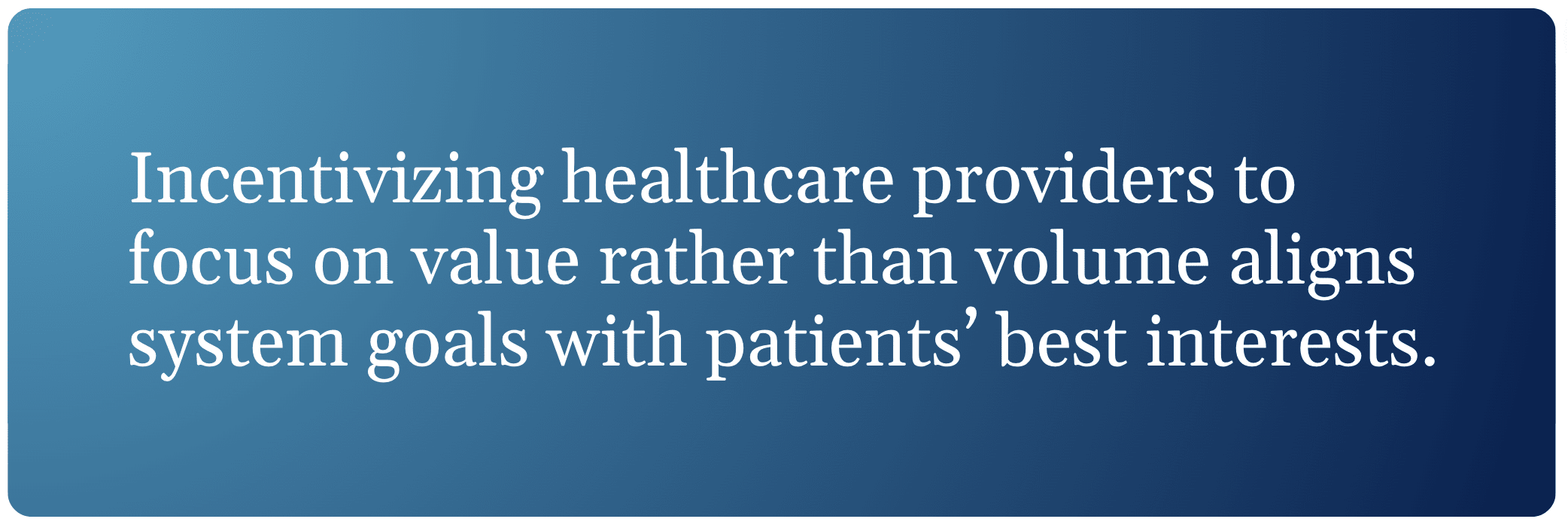The Benefits of Value-Based Care for Patients, Physicians, and Populations
In the ever-evolving landscape of healthcare, the shift towards value-based care has emerged as a transformative approach, promising a plethora of advantages for patients, physicians, and entire populations. In this article, we delve into the core concepts of value-based care, explore its fundamental components, and unpack how this model has the potential to improve patient outcomes, reduce healthcare costs, enhance patient satisfaction, foster increased patient engagement, and improve care coordination.
What is Value-Based Care?
Value-based care models represent an important departure from traditional fee-for-service healthcare systems. These models prioritize the delivery of high-quality care and improved patient outcomes while focusing on lowering costs. By incentivizing healthcare providers to focus on the value they provide to patients rather than the sheer volume of services rendered, value-based care aims to align healthcare goals with patients' best interests.

Components of Value-Based Care
Value-based care includes a number of different areas, each contributing to its overarching objective of optimizing patient well-being. These core elements include:
- Quality of Care: Ensuring that medical services meet established clinical standards and guidelines to maximize patient health outcomes.
- Patient Outcomes: Measuring and improving patients' health status and overall well-being as a result of medical interventions.
- Cost Reduction: Strategically managing healthcare expenditures while enhancing the value and effectiveness of care delivery.
Benefits of Implementing Value-Based Care
1. Better Patient Outcomes:
Value-based care models drive improved patient outcomes through personalized, evidence-based treatments. By placing a strong emphasis on preventive care, early intervention, and ongoing patient engagement, healthcare providers can proactively address health issues, leading to reduced complications and enhanced quality of life.
2. Reduced Healthcare Costs:
Another benefit of value-based care lies in its ability to curtail healthcare costs over the long term. By promoting preventive measures, early detection, and efficient care coordination -- unnecessary hospitalizations and resource-intensive interventions are minimized, resulting in substantial cost savings.
3. Improved Patient Satisfaction:
Value-based care aims to place patients at the center of their healthcare journey, fostering better communication, trust, and empathy between providers and patients. This patient-centric approach contributes to higher levels of satisfaction, as patients feel heard, respected, and actively involved in their treatment plans.
4. Increased Patient Engagement:
Through continuous monitoring, patient education, and shared decision-making, value-based care encourages patients to take a proactive role in managing their health. Empowered patients are more likely to adhere to treatment plans and make healthier lifestyle choices, leading to better health outcomes.
5. Better Care Coordination:
Value-based care models prioritize seamless collaboration among healthcare providers, specialists, and other stakeholders. This integrated approach ensures that patients receive comprehensive and well-coordinated care, reducing redundancies, preventing gaps in treatment, and enhancing overall healthcare efficiency.
Learn How to Deliver High-Quality Care with Our Free Value-Based Care Playbook
Our free Value-based care playbook is designed to help primary care clinicians and organizations deliver high-value care, with actionable insights and strategies to help you succeed in value-based care.
Download Now
FAQs
1. Who benefits from value-based care programs?
Value-based care programs benefit patients, healthcare providers, and entire populations. Patients experience improved outcomes and satisfaction, while providers are incentivized to deliver high-quality care efficiently, resulting in better population health.
2. What are the benefits of value-based care over volume-based care?
Value-based care focuses on optimizing patient outcomes and satisfaction, whereas volume-based care primarily revolves around the quantity of services rendered. Value-based care encourages preventive measures, cost savings, and better care coordination.
3. What is quality in value-based care?
In value-based care, quality refers to the degree to which healthcare services improve patient outcomes, enhance patient experiences, and effectively manage costs. It centers on providing evidence-based, patient-centered care that meets established clinical standards.
Analyze and Segment Population Health Data with Elation’s Clinical-First EHR
Request a free demo to see how Elation EHR can help you succeed in value-based care and provide exceptional patient care.
